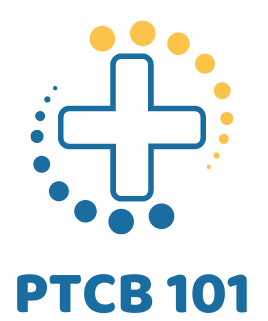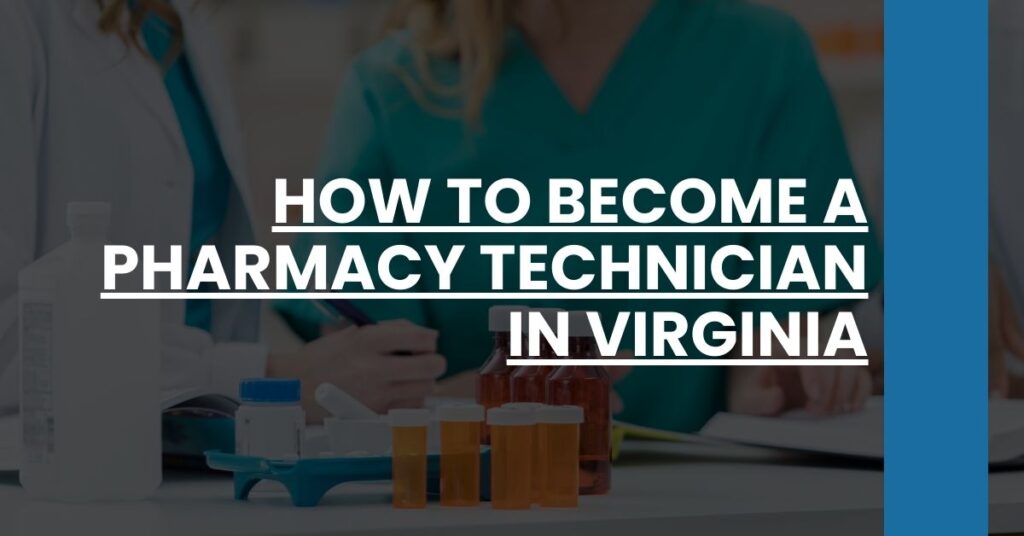Looking for programs in a specific city? Check out our lists of PTCB in Virginia Beach, Chesapeake, Norfolk, Arlington, Richmond, Newport News, Alexandria, Hampton, and Roanoke.
Becoming a pharmacy technician in Virginia is a rewarding career path with clear steps to follow.
- Educational Requirements: Understand the minimum qualifications and important courses.
- Accredited Training Programs: Explore various state-approved programs with details on duration and costs.
- Certification and Licensing: Learn the steps to get certified and licensed in Virginia.
Start your journey to become a pharmacy technician in Virginia today.
- Educational Requirements for Pharmacy Technicians in Virginia
- Accredited Training Programs
- Certification and Licensing Requirements
- Find the Right Certification Program
- 18VAC110-21-180: Requirements for Continued Competency
- Job Opportunities and Employers in Virginia
- Salary Expectations and Job Growth
- Tips for Success in Your Pharmacy Technician Career
- Resources and Further Reading
- Looking for Pharmacy Technician Information On States Bordering Virginia?
- Conclusion
Educational Requirements for Pharmacy Technicians in Virginia
To start your journey as a pharmacy technician in Virginia, you need to meet basic educational requirements. A high school diploma or GED serves as the minimum qualification. High school courses in subjects like math, chemistry, and biology can be incredibly beneficial.
High School Diploma or GED
Obtaining a high school diploma or GED is your first step. This credential is essential as it prepares you for more specialized training in pharmacy technology.
Relevant High School Courses
- Math: Essential for measuring and dispensing medications accurately.
- Chemistry: Helps you understand drug compositions and reactions.
- Biology: Fundamental in learning how medications affect the human body.
Additional courses in health science or vocational training can further prepare you, demonstrating your commitment and interest in the field.
Accredited Training Programs
Various state-approved training programs in Virginia can prepare you for a career as a pharmacy technician. These programs are available through community colleges, vocational schools, and online platforms.
Community Colleges
Community colleges, such as Northern Virginia Community College and Tidewater Community College, offer comprehensive programs. These programs usually last from six months to a year and combine coursework with hands-on training. Tuition fees range between $1,500 to $3,000.
Vocational Schools
Vocational schools like the Virginia School of Pharmacy offer accelerated programs. These can be completed in as little as 12 weeks. While more intensive and typically costing between $3,000 to $5,000, they provide quick entry into the workforce.
Online Programs
Online options, such as those from Penn Foster or CareerStep, offer flexibility. These programs usually last six to twelve months and often cost between $1,000 to $2,500. They include virtual labs and real-world externships for hands-on experience.
Curriculum Components
Most programs cover:
- Pharmacology: Study of drugs and their effects.
- Pharmacy Law and Ethics: Understanding legal and ethical guidelines.
- Human Anatomy: Knowledge of the human body.
- Pharmaceutical Calculations: Accurate medication measurement.
Hands-on training through externships is also crucial, offering practical experience to increase your employability.
Certification and Licensing Requirements
Getting certified and licensed is a mandatory step in becoming a pharmacy technician in Virginia.
Certification Bodies
- PTCB: The Pharmacy Technician Certification Board offers the Certified Pharmacy Technician (CPhT) credential.
- NHA: The National Healthcareer Association offers the ExCPT (Examination for the Certification of Pharmacy Technicians).
PTCB Certification
Passing the Pharmacy Technician Certification Exam (PTCE) is needed. The exam costs $129 and includes topics like medication safety and pharmaceutical calculations. Preparation materials, including an official study guide and practice exams, are available for an additional fee.
ExCPT Certification
The ExCPT exam costs $117 and covers similar areas. Study materials like guides and practice tests are provided by NHA.
Application Process
- Pass Certification Exam: After passing either the PTCE or the ExCPT.
- Apply to Virginia Board of Pharmacy: Submit an application, background check, and pay a $25 fee.
- Submit Proof of Certification: Attach evidence of your certification.
State License
Upon approval, you receive a state license. This needs annual renewal by March 31st. Renewal involves completing at least 0.5 CEUs (continuing education units), equivalent to five contact hours, with at least one hour related to pharmacy law.
Find the Right Certification Program
Choosing the right certification program depends on your career goals, learning style, and schedule.
Types of Programs
- Community Colleges: Best for comprehensive learning.
- Vocational Schools: Ideal for quick entry into the workforce.
- Online Programs: Perfect for flexibility.
Personal Fit
Consider accreditation and recognition by main certification boards like PTCB or ExCPT. Evaluate program costs, duration, and included coursework.
For a more detailed guide to finding suitable programs, check out the dedicated section on finding pharmacy technician programs.
18VAC110-21-180: Requirements for Continued Competency
Maintaining your license means adhering to Virginia’s regulations for ongoing education.
Continuing Education
Pharmacy technicians must complete at least 0.5 CEUs annually. One contact hour should be focused on pharmacy law.
Documentation
Keep records of your continuing education for at least two years. These records can be audited by the Virginia Board of Pharmacy.
Competency Activities
In addition to formal CEUs, consider:
- In-house Training: On-the-job education sessions.
- Seminars and Webinars: Industry updates and practical knowledge.
Employers often provide resources to fulfill these education requirements, helping you remain a competent, informed healthcare professional.
Job Opportunities and Employers in Virginia
Virginia offers diverse job opportunities for pharmacy technicians, spanning various healthcare settings. Career options include hospitals, retail pharmacies, and long-term care facilities. Each environment provides unique roles and responsibilities, making it essential to understand where you would like to specialize.
Hospitals
Working in hospitals provides a fast-paced environment with advanced responsibilities. Pharmacy technicians in hospitals like Sentara Healthcare or Inova Health System prepare IV medications, manage medication inventories, and assist pharmacists with patient medication counseling. Specializations in areas like oncology or pediatrics are also available.
Key Responsibilities:
- Prepare Intravenous (IV) Medications: Mixing and preparing sterile IV solutions.
- Manage Medication Inventories: Ensuring accurate stock levels of medications.
- Assist Pharmacists: Supporting pharmacists with prescribing and counseling.
Retail Pharmacies
Retail pharmacies like CVS, Walgreens, and Rite Aid employ a large number of pharmacy technicians. These roles involve direct customer interaction, dispensing medications, managing inventory, and assisting with insurance claims.
Typical Duties:
- Dispense Medications: Accurately filling prescriptions.
- Customer Service: Providing information and assistance to customers.
- Inventory Management: Ensuring adequate stock levels and ordering supplies.
- Insurance Assistance: Handling insurance claims and processing.
Long-Term Care Facilities
Pharmacy technicians can find positions in long-term care facilities such as nursing homes and assisted living centers. Companies like Omnicare provide medication management services in these settings, where technicians prepare medications in blister packs and manage bulk orders.
Significant Responsibilities:
- Blister Pack Preparation: Organizing medications in unit-dose packaging.
- Bulk Medication Management: Handling large quantities of medications.
- Collaboration: Working with healthcare teams to ensure timely medication administration.
Specialty Pharmacies and Mail Order Services
Specialty pharmacies and mail-order services, including Express Scripts, offer unique career paths. These roles focus on preparing specialized medications, such as biologics, and managing mail orders.
Function Specifics:
- Prepare Specialized Medications: Handling complex and compounded medications.
- Mail Order Processing: Managing and processing mail-order prescriptions.
Top Employers
Several notable employers in Virginia offer promising career opportunities:
- Sentara Healthcare
- Inova Health System
- CVS Health
- Walgreens
- Omnicare
- Express Scripts
By exploring various settings, you can find a role that aligns with your interests and career goals.
Salary Expectations and Job Growth
Understanding salary expectations and job growth trends is crucial for planning your career trajectory as a pharmacy technician in Virginia.
Average Salary
Pharmacy technicians in Virginia earn an average annual salary of approximately $35,000. However, entry-level positions may start around $28,000, while experienced technicians or those in specialized roles can command salaries upwards of $45,000.
Job Growth
The demand for pharmacy technicians in Virginia is set to grow by 12% over the next decade, according to the Bureau of Labor Statistics. Several factors drive this growth:
- Aging Population: Increased need for medication among older adults.
- Healthcare Expansion: More healthcare facilities necessitate more pharmacy personnel.
- Technological Advancements: The role of pharmacy technicians evolves with new technologies.
Factors Influencing Employment Opportunities
- Population Growth: Virginia’s growing population enhances the demand for medical services.
- Healthcare Services Expansion: More hospitals and retail pharmacies open new job avenues.
- Innovation in Healthcare: Technological progress creates new responsibilities for pharmacy technicians.
With competitive salaries and a promising job outlook, a career as a pharmacy technician in Virginia offers numerous opportunities for advancement.
Tips for Success in Your Pharmacy Technician Career
Success as a pharmacy technician requires a combination of technical skills, continual learning, and professional networking.
Continuing Education
Stay Current: Engage in ongoing education programs to stay updated on new medications and pharmacy laws.
Specialize: Pursue additional certifications in areas such as sterile compounding or chemotherapy to enhance your skillset.
Networking
Join Professional Associations: Connect with other professionals through organizations like the Virginia Pharmacists Association.
Seek Mentorship: Find mentors who can provide guidance, advice, and career support.
Hands-On Experience
Externships: Practical experience during training enhances your skills and job prospects.
Volunteer: Volunteering in healthcare settings demonstrates your commitment to the field.
Develop Soft Skills
Communication: Strong communication skills are vital for interacting with pharmacists, healthcare providers, and patients.
Attention to Detail: Precision is key for medication dispensing and record-keeping.
By focusing on continuous learning, effective networking, gaining practical experience, and honing soft skills, you set yourself up for a successful career as a pharmacy technician.
Resources and Further Reading
To further your knowledge and prepare for this career path, consider the following resources:
Websites
- PTCB
- NHA – ExCPT
- Virginia Board of Pharmacy
Books
- The Pharmacy Technician: A Comprehensive Approach by Gail Orum-Alexander
- Pharmacy Technician Certification Exam Review by Patricia K. Anthony
Professional Organizations
- Virginia Pharmacists Association (VPhA)
- National Pharmacy Technician Association (NPTA)
Utilizing these resources will support your journey in becoming a pharmacy technician in Virginia.
Looking for Pharmacy Technician Information On States Bordering Virginia?
In addition to Virginia, we suggest looking for schools in nearby states.
- How to Become A Pharmacy Technician in Maryland
- How to Become A Pharmacy Technician in West Virginia
- How to Become A Pharmacy Technician in Kentucky
- How to Become A Pharmacy Technician in North Carolina
- How to Become A Pharmacy Technician in Tennessee
Conclusion
To become a pharmacy technician in Virginia, start by meeting the educational requirements, complete an accredited training program, and secure certification and licensing. With the state’s diverse job opportunities and positive outlook, a career in this field is rewarding and full of potential. Enroll in a training program, prepare for your certification, and engage in continuous learning to succeed. Your journey begins now.

